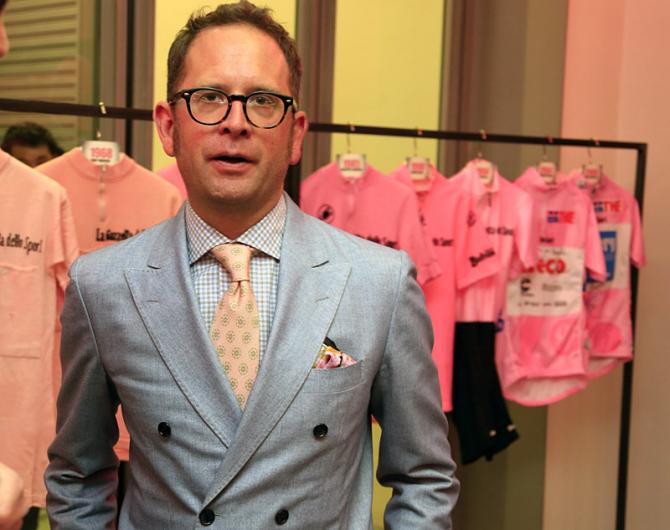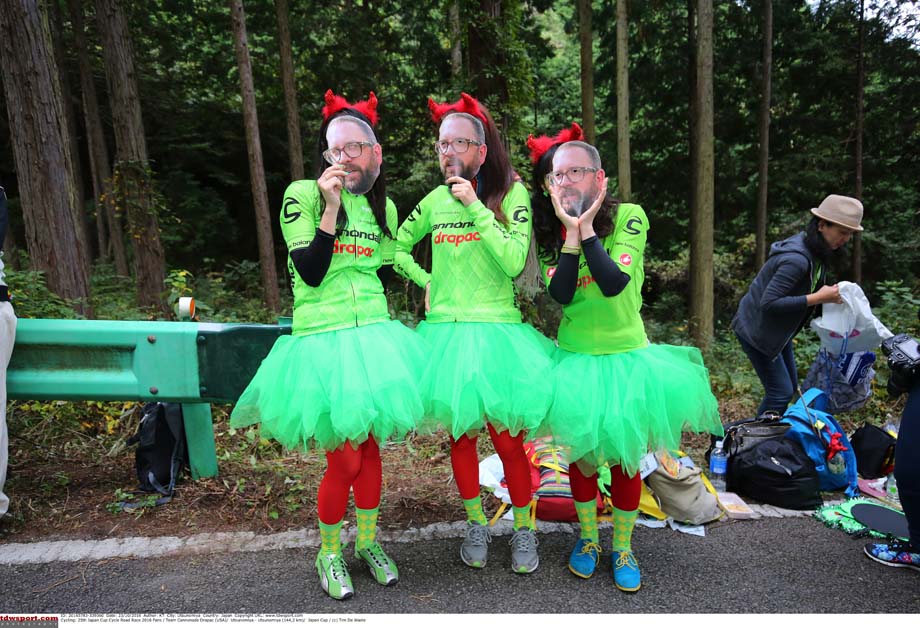Jonathan Vaughters: The WorldTour race to the bottom
Opinion: Cannondale-Drapac boss on creating a new business model for the sport





Another season passes and another team is lucky to be alive, in spite of its five stage wins at the sport's biggest race. Another team will be in the same position next season.
InCycle Video: Vaughters on Velon and growth of pro cycling
Jonathan Vaughters: Where does big-time pro cycling in the US go from here?
Marc Madiot Blog: The new WorldTour calendar is unacceptable
Rider prices rise as teams reach panic over WorldTour points
Teams fight for WorldTour survival at Il Lombardia
UCI confirms 18 applicants for 2017 WorldTour
AIGCP warn UCI against approving WorldTour reforms
The proposed reduction of the number of WorldTour teams from 18 to 17, or the prompt reversal of that rule, in this case, seems to have hit a nerve with fans, sponsors, and athletes.
And while some might see the debate on who the final slot in the big leagues should be awarded to as a negative, I'm pleased the situation has been given a spotlight. It's a backroom fight that happens each season that we can only end with a meaningful discourse. The root issue in this debate is the most important governance decision cycling faces today. To say the riders, staff, sponsors, and fans deserve better than this current race to not be last is an understatement.
The issue is not how the points system works or doesn't work. The issue is a diluted business plan that in time will ultimately fail. For big teams and small teams alike.
No system will be perfect in determining who truly is the last-ranked team. And frankly, its demoralizing and disheartening to all the teams that we're focusing on who's not the worst team in the world as opposed to what team's the "best." We should all be trying to win bike races, not finish in the middle because we were afraid to risk losing the points of seventh place.
Killing the Underdog
Should cycling have promotion and relegation at all?
Get The Leadout Newsletter
The latest race content, interviews, features, reviews and expert buying guides, direct to your inbox!
To many fans and race organizers, having promotion and relegation based on some sort of sporting merit makes sense. It allows upstart teams to rise to the top, it's common in most major European sports, and it keeps everyone pushing to be competitive.
Leicester City winning the English Premier League championship is perhaps the best example of a successful promotion and relegation system in action. However, the way cycling teams are funded is a far cry from the way football clubs are funded. And because of these funding differences, promotion and relegation will be catastrophic to pro cycling.
As opposed to giving opportunity to an underdog, such as Leicester City, cycling promotion/relegation will slowly kill the underdogs, decrease average rider salaries, and unravel the fabric that holds most teams together. Witness the situation with Dimension Data as just a small glimpse of how promotion/relegation could kill worthy, but smaller, teams.
Unlike EPL, where a demoted team is given a large check and golden parachute to help them regain their footing so they might have a chance to regain elite status the following season, in cycling a demoted team would die.
Why? Because most non-French teams have contracts that unravel if a team isn't part of the WorldTour, notably the Tour de France.
Read more on this article:
- Rider prices rise as teams reach panic over WorldTour points
- UCI confirms 18 applicants for 2017 WorldTour
- AIGCP warn UCI against approving WorldTour reforms
- InCycle Video: Vaughters on Velon and growth of pro cycling
- Jonathan Vaughters: Where does big-time pro cycling in the US go from here?
In my case, both Cannondale and Drapac could terminate their contracts if we were not in the WorldTour — it's just how most contracts work. This news would hit about Dec. 1, as the final WT selections were made, and approximately 30 riders and 70 staff members would be suddenly unemployed with little chance of finding new employment in professional cycling. This is not promotion or relegation. This is promotion or death.
The funding differences from EPL and other leagues with promotion/relegation, illustrate why cycling cannot tolerate such a system. Teams do not make money via TV and media coverage, nor do we do not have ticket-sales revenue. We only have sponsor revenue. If those sponsors leave a team that has been relegated, who gives the newly demoted team a payment to get back on its feet, like Leicester once had?
The commitment of every constituency involved in pro cycling is tempered and cheapened by the fact that output of the effort and investment could very well be eliminated and valueless in less than 365 days.
The Next Dimension
The first Tour de France was held in 1903. In a business sense, however, the sport remains immature. The core problem? Instability. That's what needs to be tackled, not points vs no points or 16 WorldTour teams vs. 17 or 18.
This is where this op-ed goes to the next Dimension (pun intended). Due to the limited sponsor-only revenue model in cycling and the unwillingness of wealthier race organizers to partition the media rights or media rights revenue, cycling teams need to come up with a radically different solution than the models that have failed for the last 100 years. All the teams in the WorldTour need to become one business, not 18. In other words: a league of teams and a singular business entity, like you see in other major sports.
Professional cycling finds itself in a very competitive media business world. Action sports, fast-paced digital content, large traditional sports, Jenna Marbles videos on YouTube, you name it — these are our competitors in a saturated marketplace. Our competition for audience, our competition for advertising dollars (sponsorship), and our competition for fan loyalty. Unfortunately, cycling is too busy fighting with itself to focus any significant effort on where the real opportunities exist. On a business level, we should stop making each other competition and start recognizing all these other forms of entertainment are our competitors.
A singular business would allow cycling to develop platforms that keep finances more stable, fans entertained, and media interest focused. Resources could be pooled for production of new, behind-the-scenes content, athlete character development, collective merchandise sales efforts, collective sponsorship sales efforts, and collective media-production efforts.
New ideas could develop and engage the growing fan based fantasy team interests. Drafting of u23 athletes turns into an event as opposed to an unknown process. Sponsors would be purchasing into a known and transparent system of measurable metrics and cooperative effort to maximize sponsorship value. Maybe a few of these ideas could even start to produce revenue that isn't from sponsorship. Finally.
Velon aside, we aren't doing any of these things, successfully or collectively. This diversification of revenue and responsibility would evolve professional cycling from a business on the edge into a stable operation with no annual single point of failure and little stability. A global sport with our kind of history and interest should not be a year-to-year proposition for the vast majority of the athletes, teams, support staff and sponsors. Can we agree on that?
So, what about a new sponsor with new ideas wanting to enter the sport? How can that happen if all the teams are locked in place? How can we accommodate their unique needs if they can't found a new team? The answer is simple: we allow them into the WorldTour and we adjust the league as a whole to accommodate their needs. If a new sponsor wanted to enter the sport, then it can negotiate with the league as to which team it should be placed with to best fit its ideas and marketing needs. This would keep teams focused on producing the best product for fans and sponsors instead of worrying about their continued existence. That's quality racing for first place, as opposed to negative racing in order to avoid being last.
Such a structure would keep the sponsorship marketplace competitive for sponsors wishing to garner naming rights of a team, as scarcity of inventory would drive value up, as opposed to the current system, in which teams fight one another to garner limited sponsors.
Additionally, a franchise model would drive and solidify fan loyalty to a chosen team, as franchised teams would be a long-term entity. This, as opposed to the stupid washing machine of "new team in, old team goes broke" we have now, would result in team (or brand) loyalty. Now, it's hard for new or casual fans to follow the sport and its characters, much less understand the team dynamics. Fans not really following chosen teams leads to less value to sponsors, as engagement and loyalty is diminished. Less value to sponsors equals lower sponsorship prices and shorter contract terms, lower sponsorship prices mean less financial stability and lower athlete salaries… until the team goes away and everyone scrambles — again — for a job.
Read more on this article:
- Smith: I'd be devastated if Dimension Data miss WorldTour selection
- Dimension Data set to retain WorldTour status for 2017
- Dimension Data face uncertain wait over WorldTour place
An example of the race to the bottom: In 2009 and 2010, Radio Shack, Highroad, and Slipstream Sports all were competing for a sponsorship from Transitions. This sponsorship was initially intended to be around $8 million annually — maybe enough to have potentially saved the no. 1 ranked — but soon to be bankrupt — Highroad. However, all three teams spent enormous time and energy slowly underbidding and undercutting one another. In the end, the sponsorship was worth far less, as was the sponsor's impression of the value they were getting. In a league scenario, this new sponsor would have felt privileged to be getting the opportunity to enter a league with only so many opportunities available to a newcomer, thus keeping the value high. Instead, they were greeted by people crawling over each other for survival.
I am certain the idea of the teams forming into one business entity (league), will not be applauded or accepted by many in cycling. Actually being implemented is something worth seriously considering once the colony on Mars is complete. It's an idea that would require great compromise and vision by many parties – and cycling is a sport that is good at neither compromise nor vision. We are stuck in the past, dominated by people who have huge financial interests in maintaining the status quo and keeping teams and athletes in constant, unstable, upheaval.
The sporting, media, and digital worlds are changing fast, and we need to innovate for cycling to remain relevant. Should there be 17 or 18 teams in the WorldTour? If we don't get off our asses, that will be the least of our worries.
I look forward to reading your comments that give alternative solutions!